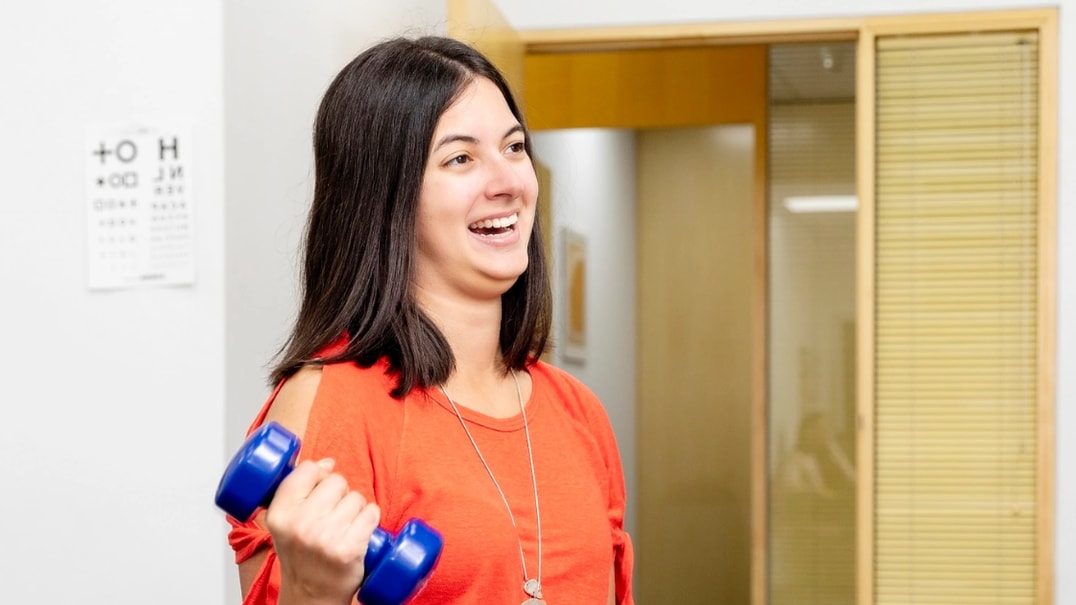Exercise. It’s something we all know we should do more regularly, but often find it difficult to fit into our daily lives. For people living with MS, these challenges can be even greater.
There is much work being done to find methods of exercise that are accessible and achievable for all people living with MS, helping overcome any potential barriers that they may face. This is incredibly important, as lots of research has been performed that highlights the many benefits exercise can generate for people living with MS.
Regular exercise leads to many positive outcomes for people with MS, including overall physical health, including reduced risk of heart attack and stroke, maintaining an appropriate weight and decreasing the chance of developing diabetes.
However, what may be less well known is that research has shown that exercise can provide a number of other advantages for people living with MS that go beyond physical health. In particular, it has been found that exercise can have significant impacts on a number of common symptoms experienced by people living with MS, as well as improve mental health and overall wellbeing. Some specific examples of studies in this area are:
- A review published earlier this year combined the outcomes of 31 studies on exercise for people living with MS and found that the results highlighted that exercise is effective at significantly reducing fatigue (1)
- A small pilot study from New Jersey, USA found that aquatic exercise can lead to improvements in mood in people living with MS (2)
- A multi-centre study involving researchers from the US, Europe and Iran found that interval training could help reduce depression in people living with MS (3)
- Multiple studies have also shown that exercise may be useful in helping to decrease cognitive problems in people living with MS (4)
- A recent small study from the US suggested that a five week therapeutic yoga program could improve emotional quality of life in people living with MS (5)
It should be noted that many of the current studies that have investigated the effects of exercise on people living with MS are relatively small and short-term.
More research is needed in this area to reach stronger conclusions, as well as assess the longer-term benefits of adopting these exercise programs.
However, the evidence is growing that physical activity can be a holistic treatment approach for people living with MS that has wide-ranging benefits, including reducing co-morbidities, improving mental health, enhancing overall wellbeing and increasing quality of life.
References
(1) Razazian N, Kazeminia M, Moayedi H, Daneshkhah A, Shohaimi S, Mohammadi M, Jalali R, Salari N. The impact of physical exercise on the fatigue symptoms in patients with multiple sclerosis: a systematic review and meta-analysis. BMC Neurol. 2020 Mar 13;20(1):93. doi: 10.1186/s12883-020-01654-y. PMID: 32169035; PMCID: PMC7068865.
(2) Genova H, Dacosta-Aguayo R, Goverover Y, Smith A, Bober C, DeLuca J. Effects of a Single Bout of Aquatic Exercise on Mood in Multiple Sclerosis: A Pilot Study. Int J MS Care. 2020 Jul-Aug;22(4):173-177. doi: 10.7224/1537-2073.2018-079. Epub 2019 Dec 5. PMID: 32863785; PMCID: PMC7446629.
(3) Negaresh R, Motl R, Mokhtarzade M, Ranjbar R, Majdinasab N, Khodadoost M, Zimmer P, Baker JS, Patel D. Effect of Short-Term Interval Exercise Training on Fatigue, Depression, and Fitness in Normal Weight vs. Overweight Person With Multiple Sclerosis. Explore (NY). 2019 Mar-Apr;15(2):134-141. doi: 10.1016/ j.explore.2018.07.007. Epub 2018 Jul 20. PMID: 30122328.
(4) Akbar N, Sandroff BM, Wylie GR, Strober LB, Smith A, Goverover Y, Motl RW, DeLuca J, Genova H. Progressive resistance exercise training and changes in resting-state functional connectivity of the caudate in persons with multiple sclerosis and severe fatigue: A proof-of-concept study. Neuropsychol Rehabil. 2020
Jan;30(1):54-66. doi: 10.1080/09602011.2018.1449758. Epub 2018 Apr 4. PMID: 29618280.
(5) Fasczewski KS, Garner LM, Clark LA, Michels HS, Migliarese SJ. Medical Therapeutic Yoga for multiple sclerosis: examining self-efficacy for physical activity, motivation for physical activity, and quality of life outcomes. Disabil Rehabil. 2020 May 12:1-8. doi: 10.1080/09638288.2020.1760364. Epub ahead of print. PMID: 32393075.


